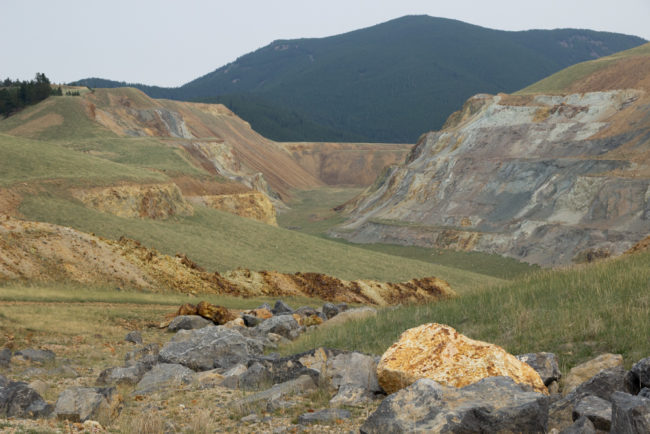By Derf Johnson

![]() Many of the proposed reforms will increase Tribal engagement and considerations. Photo of the Zortman-Landusky mine by Katy Spence.
Many of the proposed reforms will increase Tribal engagement and considerations. Photo of the Zortman-Landusky mine by Katy Spence.
Our hardrock mining laws are broken and outdated; in particular, the laws governing extraction on federal public lands. Over the coming decades, this problem will be especially acute as the mining industry pushes to extract more metals at a lower cost, in part to feed our needed transition to a clean, carbon-free energy system. In fact, many mining corporations have pivoted their messaging to the “necessity” of mining in order to produce the “critical” minerals necessary for windmills, solar panels, and batteries. While no one can argue that clean energy facilities need metals, the mining industry arguments give short shrift to the parallel necessity of protecting clean water, clean air, and public health during the climate crisis, when these essential ingredients for life and prosperity become all the more critical.
Recognizing the inevitable changes that our nation and the world now face, Pres. Joe Biden directed the U.S. Department of Interior to conduct a comprehensive review of our nation’s mining laws and regulations. Over the past several months, the interagency working group convened experts, stakeholders, and the public to review our outdated laws and make recommendations for reform. The extensive set of recommendations was released in a report in September and includes both regulatory and policy changes that agencies (i.e. Forest Service, Bureau of Land Management, etc.) could enact almost immediately, as well as more sweeping reforms that will require congressional approval.
Most notably, the report recommends that Congress scrap the 1872 Mining Law — the antiquated law that governs mineral extraction on federal public lands — and convert to a leasing system with royalty payments to the public. The 1872 Mining Law was passed during the presidency of Ulysses S. Grant, aimed at “settling” the West and regulating miners with pick-axes and mules. It has long since proven to be inadequate in protecting the environment and people from modern mining. Unfortunately, its 151-year duration implicitly signals the difficulty in reforming this law, and the likelihood of Congress passing legislation for Pres. Biden to sign is slim to nil.
However, the report also provides an extensive set of recommendations for federal agencies to implement that do not require Congressional approval, such as increasing public and Tribal engagement; making permitting processes more consistent and predictable; protecting impacted communities and workers; and safeguarding environmentally and culturally sensitive lands. Time will ultimately tell whether and how federal agencies will implement such reforms, but the report offers a relatively straightforward set of goals that agencies can and should work to implement over the next few years.
This article was published in the December 2023 issue of Down To Earth.

